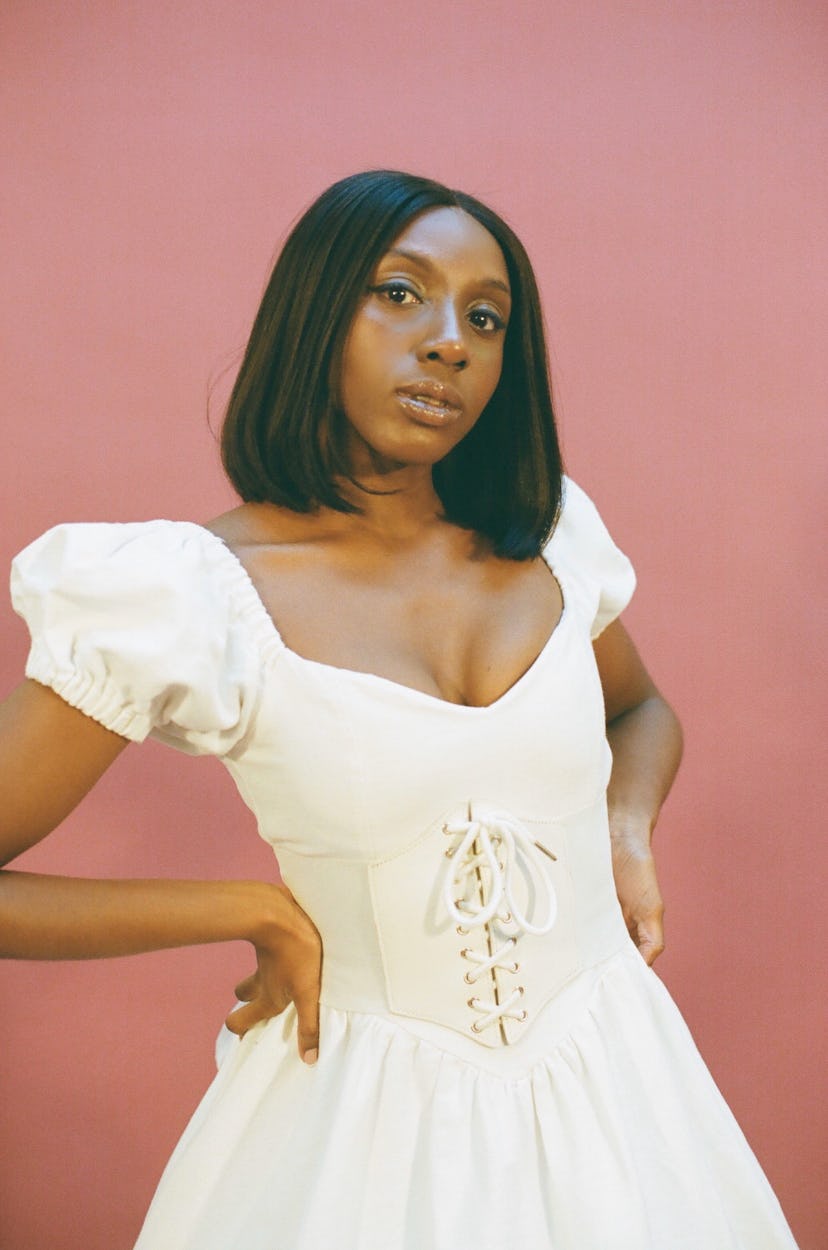In today’s world, where popular culture is synonymous with cancel culture, playing around with identity politics has become increasingly risky business. Thankfully, the comedy provocateur Ziwe Fumudoh refuses to walk on eggshells. For the new season of her satirical YouTube talk show, “Ziwe: A Race-Baiting Series,” Fumudoh gleefully takes on the role of an intrusive late-night host who forgoes comfy couch-side chats in favor of “baiting” in-the-know comedic talents onto racial thin ice. W is exclusively premiering the new season, where her disarmingly confrontational style somehow manages to get Comedy Central Stand-Up alum Sydnee Washington to admit she thinks Harriet Tubman was a “little chatty,” and Pat Regan, the white gay male cohost of the popular “Seek Treatment” podcast, to storm off set after being forced to explain what advice he would give to a black woman struggling with depression.
The most surreal highlight (and that’s saying something) is Josh Gondelman, a supervising producer for Showtime’s “Desus and Mero” (Fumudoh moonlights as one of the show’s writers), reluctantly roleplaying how he would fire Maya Angelou if he was her employer. (“Maya, it has been such a pleasure being your colleague, but unfortunately because of our recent acquisition from General Motors we are downsizing.”) Here, Fumudoh, the self-proclaimed “Master Baitor,” discusses the joys of playing the race card, mining social taboos for humor, and how crude video editing can make even the most woke social justice warrior cancelable.
Tell me about when you first started “Baited.”You know me. This is my genuine personality, for better or for worse. I break out, like, really hyperbolic conversation in my regular day-to-day life, and so this was just an extension of the conversations that I’m having every day with my friends.
It’s so funny because even in the episode with Sydnee Washington she called you a little annoying, but this is just you being you.
I think maybe it comes from having a degree in African-American studies. I love having these really intensive, deep conversations about sociological and historical issues, and how we bring our identity to everything we believe, everything we discuss, and how we move through the world. This was me in college during my freshman year at Northwestern sitting with my friends and talking about what we thought about class structure.
The first season was called Baited. Now the title is Ziwe: A Race-Baiting Series.
I think I’ve moved from where I was before. The programming is not the same at all. I’m talking to people who aren’t just straight white men. When I first started, it was like a black woman as an antagonist. Now it’s more just about creating an interesting dialogue with all types of people. So I think it’s having conversations with different people, not exclusive to white men and how they perceive me. Every single person can take a hit, myself included. I got baited myself. So it’s not that I am this moral superiority over anybody else. We’re all here, we’re all just trying to figure it out. We’re all stumbling through conversation and trying not to get canceled.
That’s why I loved Aparna Nancherla, because you had to try hard with her. I lived for the obvious edit of her spliced together list of things she hated.
I love that just because it’s clearly false. It’s fake news. It kind of reflects the way right-wing media interprets brown bodies or spaces. They’ll pull clips of Alexandria Ocasio-Cortez or Ayanna Pressley saying something completely out of context and be like, “See, this person is a racist.” So I’m trying to weaponize language in a comedic way to show that the process is inherently backward and evil.
Are you learning about race and your own prejudices, even as you’re tackling these issues in such a casual and funny way?
Definitely. I’m learning every day and constantly re-educating myself about race in America. I think that my series, from earlier episodes to the new ones, reflects someone who has grown in the last five years.
It’s less about putting the onus on guests reacting to you and more of a dance between you and your guests. Has there ever been a time when you felt uncomfortable, like, you couldn’t believe someone said something?
I felt the most surprised and nervous actually with the Sydnee Washington episode because I was like, “Why did I write these really hard questions for her to ask me in public?” I don’t want to get canceled. I don’t want to look bad. I don’t want to look ignorant. That was when I kind of had to let myself go and be humble. I am not perfect. And, like, talking about having a white boyfriend is something that makes me really uncomfortable. What does interracial dating mean about love and self-love? I don’t have an answer for that and I don’t know if I’ll ever have an answer for that. But, to contend with that on camera, I find it to be uncomfortable. I like having those uncomfortable moments. I think that’s where my comedy lives, and I like being open and honest for my audience. People who you think are especially woke are not perfect. I’m not infallible. I make mistakes, I don’t know everything and I’m problematic like the rest of us.
